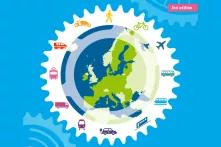European Mobility Atlas 2021
The European Mobility Atlas 2021 analyses the key facts and figures about transport and mobility in Europe, contributing to the efforts towards sustainable and just mobility in the European Union. The main takeaways from the Atlas are summarised in these 12 brief lessons.

- European mobility as it has developed has empowered many people and implies self-determination but these ACHIEVEMENTS also generate social and ecological STRESSES.
- Mass tourism and trips on aircraft and cruise ships are particularly harmful to this ENVIRONMENT. The European single market has a DECISIVE ROLE to play in this regard and therefore Europeans have a fair share of RESPONSIBILITY.
- Motorised MASS TRANSPORT has reached its limits. A European transport sector dominated by FOSSIL FUELS adds to global warming, pollution and stress.
- Cars occupy too much space. The LIMITED AVAILABLE PUBLIC SPACE should be used MORE EFFICIENTLY for cycling, walking and various forms of public transport, especially in towns and cities.
- Climate-friendly means of transport and fossil fuels are incompatible. Sustainable ENERGY AND MOBILITY TRANSITIONS go hand in hand.
- TRAINS and railways will essentially be the backbone of a climate-compatible European transport system, but are today often limited to individual countries. Investments to extend and REACTIVATE RAIL ROUTES within and across borders are necessary.
- With its Trans-European TRANSPORT NETWORK CORRIDORS the EU has set up a system for a Europe-wide transport infrastructure. It is crucial that policies implemented within the European Green Deal follow this TRANS-EUROPEAN IDEA.
- DIGITALISATION of European transport brings along OPPORTUNITIES by linking different forms of transport in one single APPLICATION. The accessibility and availability of such technologies for everyone is a CHALLENGE.
- Transport industries are manifold. The EUROPEAN AUTOMOTIVE SECTOR is undergoing thorough CHANGES. Bicycle production reinforces regional value creation and strengthens European small and medium-sized businesses.
- AVOID - SHIFT - IMPROVE is the strategy to make mobility in Europe more sustainable. The Covid-19 pandemic has forced people to adapt their mobility behaviour and has created the need to RETHINK conventional practices.
- The external costs of cars and planes as the most polluting modes of transport are not reflected in what we pay for using them. So far the implementation of the POLLUTER-PAYS PRINCIPLE is deeply flawed and needs to be tackled by EU policies such as taxation, carbon pricing or road tolls.
- The EUROPEAN MOBILITY OF THE FUTURE entails interlinked, attractive, resource-efficient and climate-friendly means of transport within a European framework and contributes to a HIGH QUALITY OF LIFE in cities and WELL-CONNECTED rural areas.

